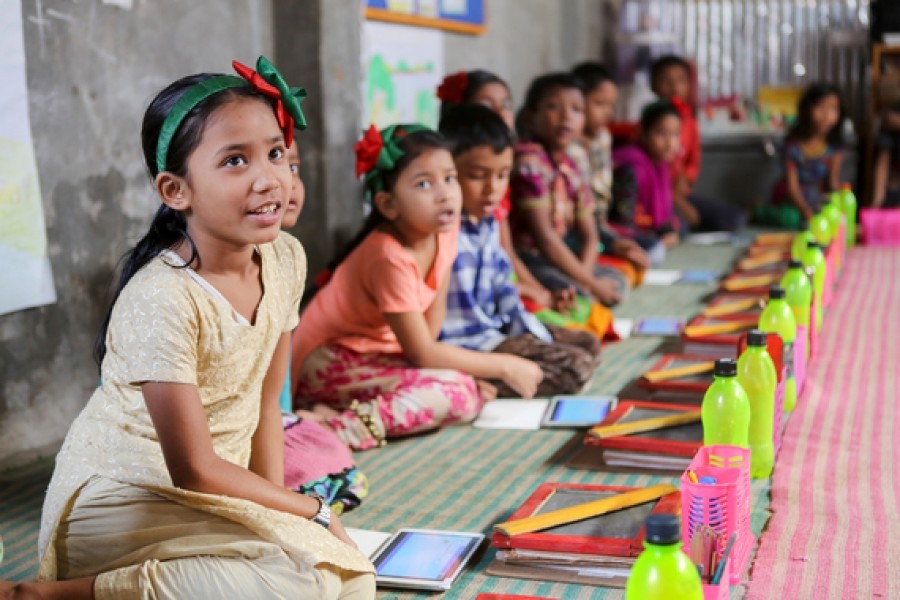Readers might remember the unusual photograph printed in this newspaper a little more than a week ago. It showed a large public notice pasted on the gate of a Dhaka kindergarten. It said the school authorities were looking for clients willing to buy the institution along with its furniture. The photograph startled many for its unconventional character. The reason for selling the kindergarten was elucidated in a contemporary daily the next day. It was learnt that financial hardship caused by the prolonged Covid-19-prompted closure of educational institutions, and the sudden halt to the school's earnings from tuition fees had led school authorities to take the decision.
The information, in fact, later emerged as the tip of an iceberg. In a week, it came to be known that approximately 100 kindergartens in the greater Dhaka had been mulling closure; many were already declared closed. The reason was more or less similar: financial hardship caused by students not attending school.
Alongside these disheartening news items, there is now information on global surveys from which the nation can take heart. A study conducted recently by the UN lists 12 countries in which school children are found 'most at risk' of falling behind. Bangladesh is not among them. These schools are located mainly in the Sub-Saharan African and southern Asian countries.
The upbeat mood, however, disappears soon. It doesn't take long for the child education-related and child rights organisations to get overwhelmed by a few stunning revelations. Based on UNESCO data, a Save the Children study shows that in April this year over 1.6 billion young learners have been shut out of school and higher institutions owing to measures in force to contain Covid-19. These students represent about 90 per cent of the world's entire student population.
Few observations could be gloomier when in its report the 'Save Our Education' says, "For the first time in human history, an entire generation of children globally has had their education disrupted." Presumably, the report is especially pointed at the children in poorer and developing countries. As has been encountered globally, a great majority of these countries lack the latest 'distance learning' mechanism like ICT (information and communications technology) capabilities to benefit from online education. The device is set to provide a stopgap solution to the misfortune of being left behind.
Thanks to its timely joining the information superhighway, Bangladesh can boast of its achievements in taking the essential curricular activities to the students of the city-based upscale schools. More and more schools are taking preparations to bring their students under online coverage in case the novel coronavirus pandemic threatens to afflict countries for an indefinite period.
A lot of seemingly insurmountable problems lie with the rural schools in backward regions. Remote villages in Bangladesh and scores of poorer countries lack the basic requirements for continuing their school studies even in normal times. In spite of school-level education being completely cost-free, with female students getting stipends, the trend of students being weaned off studies continues unabated in Bangladesh. The general child education scenario now prevailing in the country and many middle-income aspirant countries is, thus, defined as one filled with adversities.
The parental commitment to keep children up to, at least, the secondary level in school found absent in Bangladesh's rural areas. Whether a school has electricity or the internet connection matters little to these parents. The corona pandemic-prompted indefinite closure has handed the parents a strong pretext to engage their children in different types of work. Besides, teenage girls are forcefully married off. What the murky developments boil down to is the ongoing closure of schools may lead to the permanence of an age-old scourge in rural education -- rising dropout rate. To put it in global perspective, this rate could affect between 7.0 and 9.7 million children.
However, there are notable exceptions which may prompt child education experts worldwide to look to better times. As they observe, it is the smooth access to internet connections, and thus online classes, which may encourage lots of students to keep connected to their rural schools. At this point, wide and unhindered electricity coverage of outlying villages emerges as a sine qua non. In Bangladesh these days, school students serious about their studies and eying the advanced stages of education are found aplenty. To them the Covid-19 pandemic school closures came as a bolt from the blue. Lack of facilities for online classes, like the ones benefiting their urban counterparts, continues to add to their woes -- and disillusionments over the very need for studies. Even the bare minimum or ramshackle access to online classes can prompt these students to remain connected to their curricular activities.
Unfortunately, reality speaks otherwise. A large number of both village and less privileged urban schools are
away from online class facilities. Quite reasonably, they can't expect to retain their students. The situation's domino effect, the irregular fund generation in particular, might prompt many teachers to search for out-of-school jobs. Closure of more privately run pre-primary and primary schools in the large cities could emerge as another face of the 'new normal'.
The forecasts by the UK-based charity Save the Children comprise a lot of other grimmer aspects of the present situation. It says the economic fallout of the corona-prompted crisis could force an extra 90-117 million children into the poverty trap, with a "knock-on effect on school admissions". Bangladesh has lately been pouring funds into school education quite generously. The Covid-19 pandemic has botched its future projects. The charity's proposal for governments and donors to invest more to create a new global education plan is a pragmatic idea.


